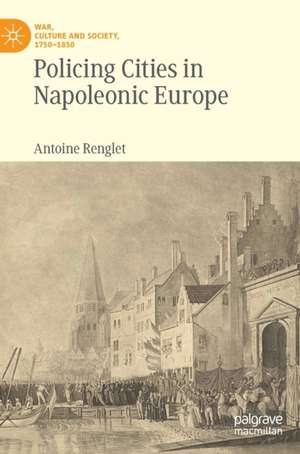Policing Cities in Napoleonic Europe: War, Culture and Society, 1750–1850
Autor Antoine Rengleten Limba Engleză Hardback – 22 noi 2022
| Toate formatele și edițiile | Preț | Express |
|---|---|---|
| Paperback (1) | 780.19 lei 6-8 săpt. | |
| Springer International Publishing – 22 noi 2023 | 780.19 lei 6-8 săpt. | |
| Hardback (1) | 691.14 lei 3-5 săpt. | +21.87 lei 6-12 zile |
| Springer International Publishing – 22 noi 2022 | 691.14 lei 3-5 săpt. | +21.87 lei 6-12 zile |
Din seria War, Culture and Society, 1750–1850
- 15%
 Preț: 694.87 lei
Preț: 694.87 lei - 15%
 Preț: 705.18 lei
Preț: 705.18 lei - 15%
 Preț: 705.99 lei
Preț: 705.99 lei - 15%
 Preț: 587.20 lei
Preț: 587.20 lei - 15%
 Preț: 640.88 lei
Preț: 640.88 lei -
 Preț: 202.05 lei
Preț: 202.05 lei -
 Preț: 388.72 lei
Preț: 388.72 lei - 15%
 Preț: 644.95 lei
Preț: 644.95 lei - 18%
 Preț: 791.88 lei
Preț: 791.88 lei - 15%
 Preț: 647.40 lei
Preț: 647.40 lei -
 Preț: 196.88 lei
Preț: 196.88 lei -
 Preț: 385.08 lei
Preț: 385.08 lei -
 Preț: 396.62 lei
Preț: 396.62 lei -
 Preț: 213.58 lei
Preț: 213.58 lei - 15%
 Preț: 645.79 lei
Preț: 645.79 lei - 15%
 Preț: 699.28 lei
Preț: 699.28 lei - 18%
 Preț: 895.45 lei
Preț: 895.45 lei - 18%
 Preț: 729.53 lei
Preț: 729.53 lei - 15%
 Preț: 637.75 lei
Preț: 637.75 lei -
 Preț: 396.40 lei
Preț: 396.40 lei -
 Preț: 388.13 lei
Preț: 388.13 lei - 15%
 Preț: 698.94 lei
Preț: 698.94 lei - 15%
 Preț: 646.43 lei
Preț: 646.43 lei - 15%
 Preț: 642.18 lei
Preț: 642.18 lei -
 Preț: 383.93 lei
Preț: 383.93 lei - 15%
 Preț: 700.61 lei
Preț: 700.61 lei - 18%
 Preț: 788.09 lei
Preț: 788.09 lei - 18%
 Preț: 723.38 lei
Preț: 723.38 lei - 15%
 Preț: 535.84 lei
Preț: 535.84 lei - 15%
 Preț: 694.04 lei
Preț: 694.04 lei - 18%
 Preț: 730.35 lei
Preț: 730.35 lei
Preț: 691.14 lei
Preț vechi: 863.93 lei
-20% Nou
Puncte Express: 1037
Preț estimativ în valută:
132.25€ • 141.42$ • 110.27£
132.25€ • 141.42$ • 110.27£
Carte disponibilă
Livrare economică 28 martie-11 aprilie
Livrare express 13-19 martie pentru 31.86 lei
Preluare comenzi: 021 569.72.76
Specificații
ISBN-13: 9783031110535
ISBN-10: 3031110536
Pagini: 279
Ilustrații: XVI, 279 p. 16 illus., 13 illus. in color.
Dimensiuni: 148 x 210 x 24 mm
Greutate: 0.5 kg
Ediția:1st ed. 2023
Editura: Springer International Publishing
Colecția Palgrave Macmillan
Seria War, Culture and Society, 1750–1850
Locul publicării:Cham, Switzerland
ISBN-10: 3031110536
Pagini: 279
Ilustrații: XVI, 279 p. 16 illus., 13 illus. in color.
Dimensiuni: 148 x 210 x 24 mm
Greutate: 0.5 kg
Ediția:1st ed. 2023
Editura: Springer International Publishing
Colecția Palgrave Macmillan
Seria War, Culture and Society, 1750–1850
Locul publicării:Cham, Switzerland
Cuprins
Introduction.- 1. The police system in the cities.- 2. The development of a professional culture.- 3. From cities to Empire: ‘imperialization’ of police structures.- 4. Police work and the people.- 5. Policing as a tool for governing and improving the city.- 7. Conclusion.
Notă biografică
Antoine Renglet is Researcher at the University of Louvain-la-Neuve and lecturer at Saint-Louis University of Brussels, Belgium. He holds his PhD from the universities of Lille and Namur. He was visiting researcher at the Center for the Study of Law and Society at Berkeley in 2014, and Alexander von Humboldt Fellow at the Goethe University of Frankfurt in 2019.
Textul de pe ultima copertă
This book shows how the police functioned in the cities of the Napoleonic Empire. Shifting attention away from political repression, it focuses on the men who embodied this institution and made it work day-to-day. Based on extensive archival research, the book shows how the Napoleonic police were indeed an instrument of power, but also a profession and a service to the public. Traditionally associated with the image of Joseph Fouché and with political surveillance, the Napoleonic police, when studied from the local level, thus reveals itself to be much more complex and oriented simultaneously towards both the preservation of the regime and maintaining good urban order.
Antoine Renglet is Researcher at the University of Louvain-la-Neuve and lecturer at Saint-Louis University of Brussels, Belgium. He holds his PhD from the universities of Lille and Namur. He was visiting researcher at the Center for the Study of Law and Society at Berkeley in 2014, and Alexander von Humboldt Fellow at the Goethe University of Frankfurt in 2019.
Antoine Renglet is Researcher at the University of Louvain-la-Neuve and lecturer at Saint-Louis University of Brussels, Belgium. He holds his PhD from the universities of Lille and Namur. He was visiting researcher at the Center for the Study of Law and Society at Berkeley in 2014, and Alexander von Humboldt Fellow at the Goethe University of Frankfurt in 2019.
Caracteristici
Moves the focus from the Parisian center of power to the day-to-day work of police in European cities Explores the way the Napoleonic police system was implemented and articulated within urban police Shows the richness of the local archives to explore Napoleonic imperialism
